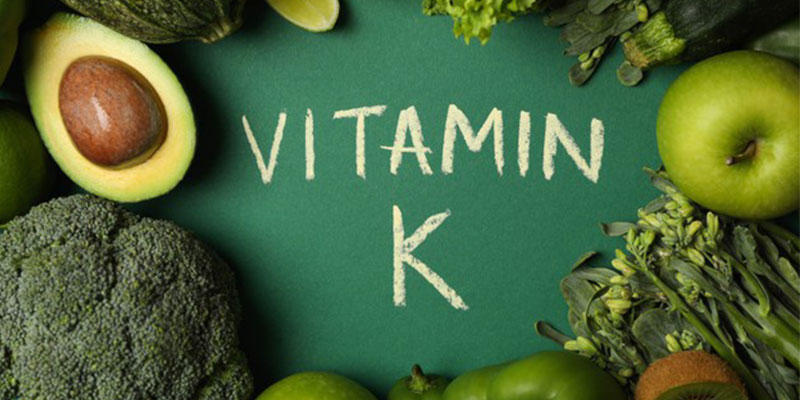Vitamin K Benefits, Sources, Dosage, and Side Effects

Introduction
Want to know everything about vitamin K? Then you are on the right page!
Vitamin K is a group of fat-soluble compounds that play a key role in blood clotting and preventing excessive bleeding. Also, this vitamin is essential for metabolism and bone health. But unlike other vitamins, vitamin K is not usually taken as a dietary supplement.
This article will tell you the sources, benefits, dosages, and side effects of Vitamin K. in short everything that you need to know about this vitamin is in this article. So without wasting any more of your precious time, let’s check out!
Avertisement
What is Vitamin K?
Vitamin K is a group of fat-soluble vitamins that is essential to produce prothrombin and to induce blood clotting. Prothrombin is a type of protein that is essential for bone metabolism and blood coagulation. Vitamin K helps to synthesize Protein C, Protein S, and Protein Z. These proteins help to degrade blood coagulation factors Prothrombin, Factor VII, Factor IX, and Factor XIII.
There are 2 types of vitamin K- Vitamin K1 and Vitamin K2.
Vitamin K1
Phylloquinone or Vitamin K1 is the 1st type of Vitamin K, which is mostly found in plant foods. Vitamin K1 is almost 75-90% of the vitamin K that humans consume. Top vitamin K1-rich foods are-
- Kale
- Spinach
- Broccoli
- Brussels sprouts
- Collard greens
Vitamin K2
Vitamin K2 comes with several subtypes, known as menaquinones (MKs). These subtypes are named based on the length of their side chain. Vitamin K2s subtypes range from MK-4 to MK-13. This vitamin is mostly produced in the gut but the gut bacteria. Also, vitamin K2 is found in fermented foods. The following list comes with several foods that are high in vitamin K2.
- Natto
- Hard cheese
- Egg yolk
- Chicken
- Beef liver
- Porkchop
Avertisement
Sources of Vitamin K
As we have already said Vitamin K is one of the most important vitamins our body needs. It helps in blood clotting as well as maintaining bone health. In this section, we will write about foods that are high in Vitamin K.
- Kale
- Cooked Broccoli
- Raw Swiss Chard
- Natto
- Spinach
- Cooked Brussels Sprouts
- Green Beans
- Prunes
- Kiwi
- Soybean Oil
- Avocado
- Cheese
- Green Peas
- Parsley
- Cabbage
- Beef Liver
- Pork Chops
- Chicken
- Goose Liver
Avertisement
Benefits of Vitamin K
Vitamin K comes with ample health benefits and very essential for your heart health. It treats the body in various ways. Let’s check the benefits Vitamin K provides-
1. Blood Coagulation
Vitamin K produces some proteins and factors that help to clot blood. Without this vitamin K, our body will not be able to control blood loss and form a clot in the wound. For the treatment of hypoprothrombinemia in newborns, Vitamin K is an essential factor.
2. Maintains Bone Health
Just like Vitamin D, Vitamin K also plays an important role in maintaining bone and muscle health. This vitamin can lower the risk of bone damage and osteoporosis. Vitamin K improves bone density and thus lowers the risk of fractures. As well as this vitamin supports the maintenance of strong bones by improving calcium absorption by the gut.
3. Improves Heart Health
In older adults, vitamin K maintains the blood glucose level and lowers the blood pressure level by preventing mineralization. Therefore, it helps the heart to pump up blood through the body.
Avertisement
Dosage of Vitamin K
The recommended dosage of vitamin K is as follows.
| Age Group (Year) | Adequate Quantity (mcg/day) |
| 0-6 months | 2 |
| 7-12 months | 2.5 |
| 1-3 | 30 |
| 4-8 | 55 |
| 9-13 | 60 |
| 14-18 | 75 |
| Above 18 (women) | 90 |
| Above 18 (Men) | 120 |
For pregnant and lactating women (under 19)- 75 mcg/day
For pregnant and lactating women (19-38)- 90 mcg/day
Avertisement
Deficiency of Vitamin K
Well, there is a severe symptom of Vitamin K deficiency and that is excessive bleeding. From any wounds or cuts, tremendous bleeding can occur. Some other symptoms are:
- Person bruises easily
- Gets blood clots just under the nails
- Brittle nails
- Chapped lips
- Bleeds in the mucous membranes
- Constipation
- Dark stool
Avertisement
Causes of Vitamin K Deficiency
Vitamin K deficiency is not really normal for adults. But some people are at risk of severe vitamin K deficiency.
- People suffering from flu or any infections and taking antibiotics
- A person who is on a diet that lacks Vitamin K
- People who take blood thinners like warfarin regularly
Avertisement
Bottom Line
Always remember that having a diet that contains all the essential minerals is always better than intaking any supplement! Make sure to consult a doctor before incorporating any Vitamin K supplements into your diet. Because a supplement should only be taken at the time of deficiency and under medical supervision only.
Did you like this article? Did we miss anything? Should we write something more? Do tell us in the comment section below! Don’t forget to share this article with your friends and family.




Responses